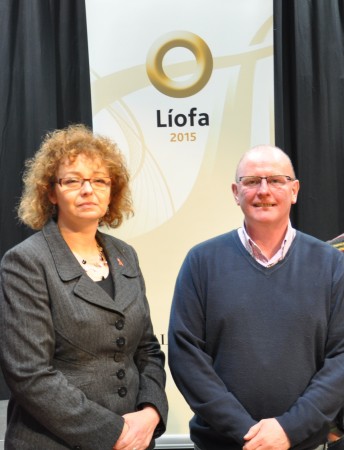
Former Sinn Fein Culture Minister, Carál Ní Chuilín who set up the Liofa bursary scheme
IN what is being seen as a dramatic U-Turn by the DUP, Communities Minister Paul Givan has announced that he has now found the necessary money to fund the Irish Language Liofa bursary scheme.
The Minister cut the funding just days before Christmas which many seen as a political decision in a war of political attrition between his party and Sinn Fein.
Sinn Fein Foyle MLA Martin McGuinness said the £50,000 cut was part of the reason for his resignation as deputy first minister on Monday.
Now this morning, there has been a volte face by the DUP.
Communities Minister Paul Givan tweeted that he had “identified the necessary funding to advance” the scheme.
He also said the original decision was not “political”.
SDLP MLA Sinéad Bradley said that she wanted “to be positive” and welcome the funding but she felt it should not have been cut in the first place.
TUV leader Jim Allister claimed the decision was the first of many concessions to come by the DUP to Sinn Fein to head of an Assembly election in March.
“Where did he find this money all of a sudden? Down the back of his sofa?” mocked Mr Allister.
Mr McGuinness resigned on Monday in protest at the DUP’s botched handling of the Renewable Heat Incentive (RHI) scheme, which could cost taxpayers £490m.
However, he and Sinn Féin have also cited concerns with the DUP, including the axing of the Liofa scheme.
The Líofa Gaeltacht Bursary Scheme enabled at least 100 people a year to attend summer Irish language classes in the Donegal gaeltacht.
The programme was set up by former culture minister, Carál Ní Chuilín.
The Department for Communities (DfC) announced the decision in an email sent to the boards of the gaeltacht colleges on 23 December.
It read: “Mar gheall ar choigilteas éifeachtúlachta ní bheidh an Roinn ag soláthar Scéim Sparánachtaí Líofa i 2017. Nollaig mhaith agus bliain úr faoi mhaise daoibh.”
This translates as: “Because of efficiency savings, the department will not be providing the Líofa bursary scheme in 2017. Happy Christmas and Happy New Year.”
The president of Comhaltas Uladh, the Ulster branch of Irish language organisation Conradh na Gaeilge, described the move as a “blatant act of discrimination”.
“Comhaltas Uladh of Conradh na Gaeilge, considers this to be quite simply a deliberate and cynical attack on the Irish language, without any justification nor reason,” said Dr Niall Comer.
Tags:




